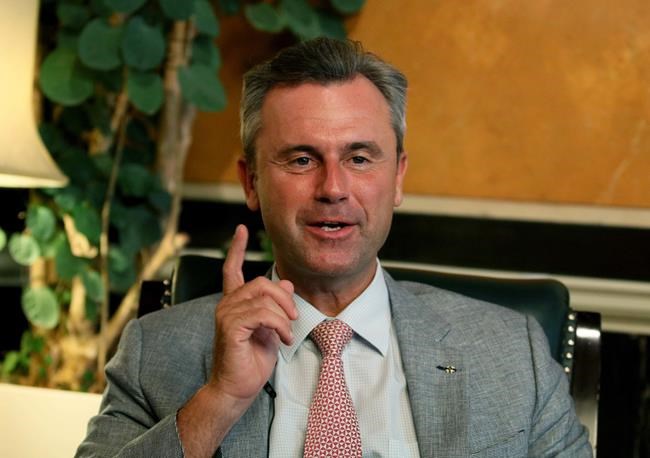Elevate your local knowledge
Sign up for the iNFOnews newsletter today!
Sign up for the iNFOnews newsletter today!
Selecting your primary region ensures you get the stories that matter to you first.

VIENNA – The right-wing politician whose renewed candidacy for the Austrian presidency has Europe’s pro-EU political establishment in a tizzy, insists he’s miscast as a champion of his country’s departure from the European Union.
“I hope that doesn’t happen,” Norbert Hofer told The Associated Press as he prepared for a fall rerun of flawed presidential elections that he only narrowly lost. “I want the EU to develop positively. … Existence outside the union would be extremely difficult for Austria.”
Already jubilant over Britain’s referendum vote to exit the EU, Europe’s euroskeptic parties hailed last week’s ruling by Austria’s constitutional Court that the vote could have been skewed by rampant irregularities and has to be held anew. They see that as giving Hofer another chance — and, through him, the next possible step toward an EU breakup.
“After the happy victory of Brexit in Britain, Austria also has a chance to find the path to freedom and national pride,” exulted Marine Le Pen of France’s far-right National Front in response to the court decision. “France’s turn will be next.”
Europe’s pro-EU political establishment had let out a collective sigh of relief over what appeared to be the win by left-leaning contender Alexander Van der Bellen after the May 22 vote. Hofer was leading after the polls closed, but final results after a count of absentee ballots put Van der Bellen ahead by a little more than 30,000 votes.
Adding to consternation at the rerun, Hofer said he could imagine a vote similar to Britain’s in Austria within a year “if the union develops wrongly.”
But in an interview Thursday, Hofer took pains to paint himself as a critic but also a backer of the European Union, depicting it as a positive force as long as it devolves into less centralism and toward more say by its member nations.
The 10 founding nations of what became today’s EU pledged to work for “an ever closer union” in a 1983 declaration. But Hofer says that Austrians — like the citizens of other nations — now have more EU than they bargained for when Austria voted for membership 21 years ago.
“The basic idea was actually to create an economic union so that the nations … do not fight wars against each other anymore,” he said. “Then came the political union that became paramount and that’s when the real problems began.” Now, he said, Brussels is focused on issues “that members themselves can better decide.”
Some pro-EU politicians suggest that more centralism is actually needed. As an example, they cite the consensus required to make decisions on major issues, pointing to deadlock on EU-wide refugee distribution as a result.
But Hofer said abolition of the consensus would benefit big countries at the expense of Austria and other small member nations, and would strengthen his conviction that the EU had overstepped its mandate.
As part of needed reform, he called for new leadership in Brussels, singling out EU commission president Jean-Claude Juncker as one person he said should go.
Hofer invoked Juncker’s initial push for a decision in Brussels on a contentious free-trade agreement with Canada instead of putting the issue to a vote in national parliaments. Coming just after the British referendum results were published, that call, said Hofer, was “a wrong signal at a wrong time” reflecting what he said is insensitivity to the popular will in the EU.
Hofer said he supports unrestricted free movement and right to employment across the EU but only if member nations are allowed to hold back social benefits for EU nationals who are non-citizens until they have established an employment record.
On the British vote, Hofer said he was surprised both over the outcome and criticized the reaction of some leading figures who had pushed for an EU exit.
“I have the feeling that neither the European Union nor the British were ready for the possibility that the referendum can have this result,” he said. “And the fact that those people who supported Brexit or made the referendum possible have now resigned from office is very unusual.”
He said he hoped the British vote was a wakeup call in Brussels to move away from centralist control, saying an exit referendum is “not what I wish for Austria.”
“Maybe the European Union can even come out invigorated out of this crisis,” he said.
.
This site is protected by reCAPTCHA and the Google Privacy Policy and Terms of Service apply.
Want to share your thoughts, add context, or connect with others in your community?
You must be logged in to post a comment.